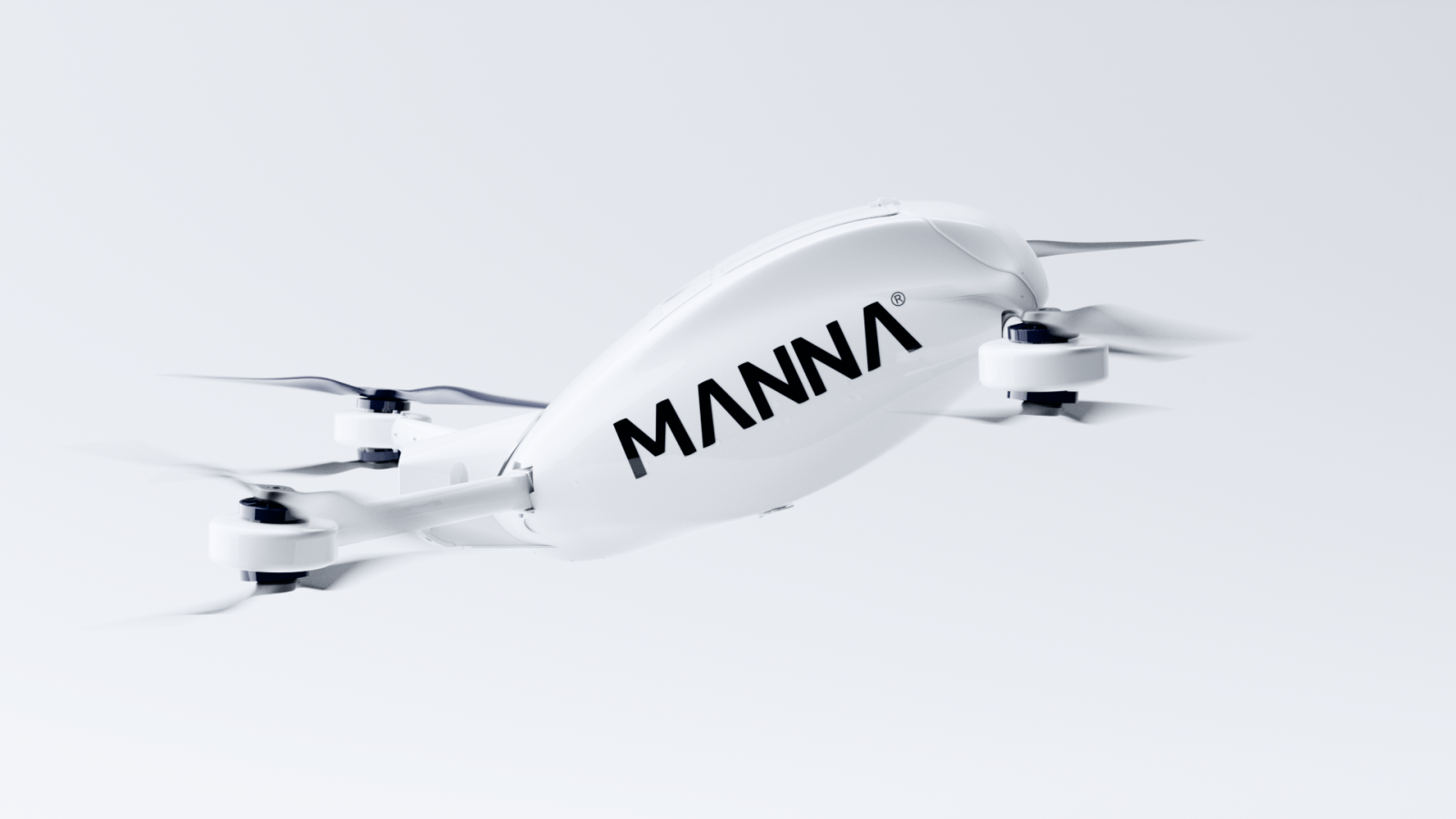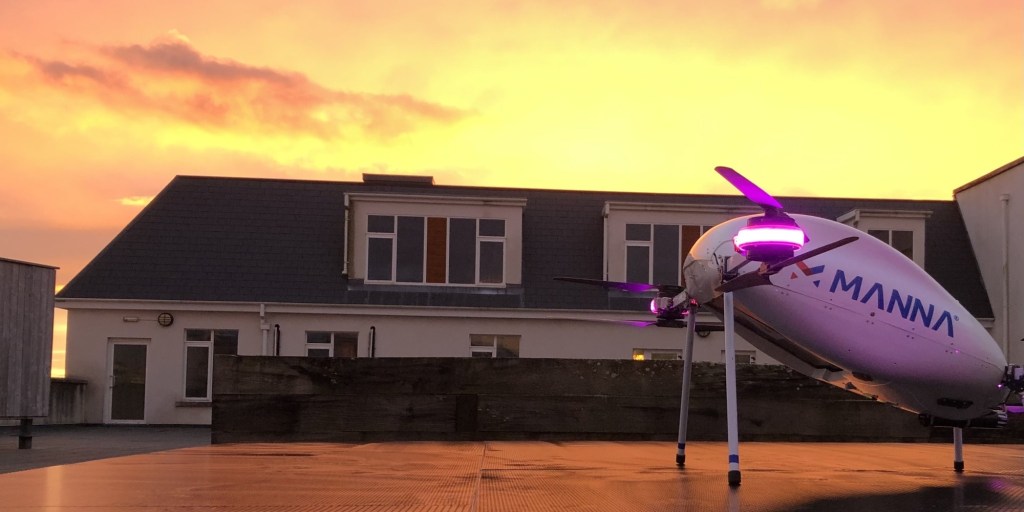
In the third and last installment of DroneDJ’s interview with Bobby Healy, the irrepressible Manna Aero CEO pivots from his plans to introduce drone delivery around Europe to discuss his strategy for launch in the potentially enormous US market. That involves certification of Manna’s proprietary UAVs; introduction and expansion of drone transport through widening suburban “cohorts of scale”; and raising the considerable capital that will require with, most likely, a Wall Street flotation. Should he get the company there, Manna might well have reached the solid, advanced state of growth to allow Healy to move on to his next challenge.
So by the end of 2024, you’ll be scaling across suburban Ireland, launching and building the business around Europe, yet also moving into the US. Why bite off so much at once?
That’s a very good question, and sometimes I ask myself as well because we have limited resources. The reason is we firmly believe the USA is going to be the most interesting and exciting market for drone delivery. It’s enormous, with a particularly strong willingness to purchase delivery products and use new technology for that. So it’s very clear that the USA will be the biggest market once this launches.
And while we’re very happy becoming the leader in Europe, we also want to be seen as a leader in the United States – and you can’t conceivably hope to lead in the US if you’re not operating there. So we have teams based in San Francisco and LA that are building this entry for us with the same technology stack that we have here in Europe. We have every intention of becoming the leader in the US once regulation becomes clearer and timelines are defined.
But operation relies on drone certification, and as a non-US company you can’t obtain FAA waivers allowing introduction of drone deliveries the way American companies have until your drone is approved.
There’s never a good time to start this off in the USA. Some companies have gotten stuck, making no progress there for eight or nine years, and uncertain about what the requirements are or will be. It’s great to see some trials of drone delivery, but they’ve made little or no tangible progress in scaling to be able to say confidently when that’s going to happen. And that’s a dangerous thing – particularly for a privately funded company – to spend money for no reason.
It’s more difficult to operate in the USA if you’re a foreign company, due to asymmetric laws and regulation. But we do think they ultimately will iron out over time. After all, given that US companies are looking to come to Europe, I think it should be just as easy for European companies to go to the USA.
Meaning, you’re starting the certification process ASAP, concurrent with European expansion, knowing that’s going to take time, and US drone deliveries won’t be taking off without you awaiting FAA approval… ?
Yes. The certification process for us is still at the start. We know our aircraft is perfect for European certification, but there are some differences between the two (processes). If you force me to give a number (for getting US approval), I would say a year to 18 months. It could be less, could be more – it depends on how much credit we get for our certification in Europe. What we’re bringing into the USA is an aircraft that made 130,000 flights in production over populated areas, and a stack that’s done the same. So we’re hoping that should allow us to go faster than most companies would be able to in getting certified in the USA.
Read: Manna drone delivery CEO Bobby Healy discusses EU, US expansion
Might drone certification speed up even more amid efforts by various regulators to harmonize and speed AAM aircraft approval between them?
The irony is it’s easier for that to happen with the big aircraft that carry people, because it’s the standard regulatory environment in terms of hardware for type certification. And the operation of those is different because of the autonomy aspect of U-Space and lower altitudes. You should be able to certify an aircraft in the United States, the passenger drone, and fly it in Europe under harmonization rules. But that won’t apply to the operation of it, just the actual hardware.
It also doesn’t apply in our space, unfortunately. There there’s divergence between the EASA and FAA on what drone certification and means of compliance should look like. That bar should be lower than for passenger aircraft, but not that much lower.

How long will it take to roll out US drone deliveries once your UAV is certified?
We’ve already done that three times in Ireland, and it takes us about two weeks to spin up a town. With our service, once we have the aircraft built and authorized, it’s very quick – we just fly off a roof or a carpark with minimal infrastructure requirements. So with certification and the requisite manufacturing in place, we expect to do about one suburb every week, and accelerate from there.
I’m guessing huge but drone-shunning NYC is not on the list.
No. Unfortunately, New York is unlikely to ever get drone delivery, in my view. New York City, certainly, but even its suburbs may involve densities that are just too high – the tall buildings, lack of deliverable places, etc. So for us, the 82 million detached single family homes in the suburbs of America are the targets.
Which of those are the priorities, the low-hanging fruit to start with?
We don’t think of it as a particular location or region, but in terms of cohorts of scale. A lot of the suburbs of say, half a million people and upwards will be the first, and then we’ll go down to the next cohort – 200,000, 100,000. You’d want to go for as many suburbs of a certain size initially, and then widen your penetration by going to smaller suburbs.
Read: Healy interview II: Scaling Manna drone delivery under ‘well-defined, cohesive’ EU regulation
Presumably that’s going to require serious capital to finance that beyond your current $30 million reserves.
We have enough cash to run our operations, including the US, through the end of 2024. So we’re good to go. Will we eventually raise more money? Yes, we will.
The capital requirements for a business like this, when scaling, will be absolutely enormous. Even the operational costs involved will enormous – and our ambition is very high. We really want to be the one business that goes as fast as possible to as many markets as possible. And it’s likely the best way to achieve that is being public.
Meaning, presumably, the NYSE or NASDAQ?
I visited both NASDAQ and NYSE last month when I was in New York…
We won’t be looking for early success and to sell to a big rival. We’re going to try and become a public company quickly, and the enabler for that is to get to the beginning of scale showing good, profitable economics on a delivery basis. The team and I have a clear plan, which is we demonstrate scalability through profitable economics of operation in a particular location.
If that happens, where do you see Manna in a decade – and yourself?
I first see us achieving our certification so we can scale across multiple markets, and within three to five years achieving broader scaling. And at some point during that… we’ll most likely become a public company. And I think that, for me, that would be it. I mean, that would be just knocking it out of the park with a result I’d be very proud of.
Very quickly, we’ve achieved more than most (rivals) have, and I’m quietly confident that if it can be done, we will be the team that will do it.
FTC: We use income earning auto affiliate links. More.



Comments